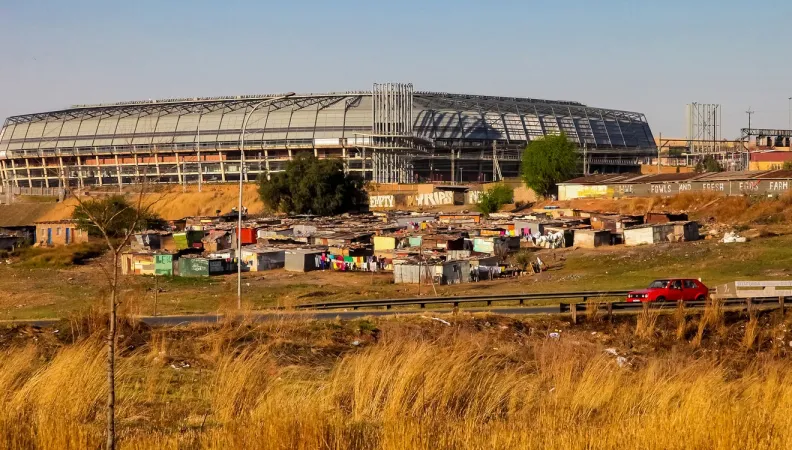Share the page
Tackling Inequality and Climate Change Simultaneously in South Africa
Published on

“No country should have to choose between tackling poverty and preserving the planet,” French President Emmanuel Macron told the Summit for a New Global Financial Pact this summer. It’s a sentiment shared by activists and leaders around the world. As the first country to sign a Just Energy Transition Partnership in 2021, South Africa is making every effort to resolve this dilemma. With COP28 just a few days away, what have they found?
“Inequalities are not inevitable,” argued European Commissioner Jutta Urpilainen at the “Inequalities, Work and Nature” Conference co-organized at the University of Cape Town earlier this month by AFD, the South African government, the EU and the African Centre of Excellence for Inequality Research (ACEIR).
As sub-Saharan Africa’s second-largest economy, South Africa is grappling with the dilemma of driving an energy transition to curb its reliance on coal (which accounts for 90% of electricity production and roughly 100,000 jobs) and helping to combat climate change, while striving to avoid exacerbating high inequality.
A multidimensional transition
“Transitioning away from coal to cleaner renewable sources of energy is necessary for climate mitigation. Yet, it poses challenges in terms of job losses in the coal sector, energy security, and the need for significant investment in the new infrastructure,” says Kenneth Morolong, the South African President’s Minister of State.
Further reading: €300 Million for the Energy Transition in South Africa
This underscores the complexity of the transition, which has an impact on public finances, the balance of trade, taxation and financial stability, as well as on governance, social protection and public health.
Rallying all sectors of society
In South Africa, the just transition has been taken to the highest political level, with the definition of economic, ecological and social objectives for 2030. The first challenge: financing. The first JET-P-related loan commitments were made in 2022 by France, via AFD, and Germany, via KfW. As it stands, it is the commitment of private players that will be decisive in transforming the economy.
“Implementation is key,” says Saul Musker, Director of Strategy and Delivery Support in the Private Office of the President in South Africa. The local level has a special role to play, since the energy transition does not affect all areas and populations in the same way. “Community is the ground zero for a just transition,” confirms Dr. Crispian Oliver, Director of the Presidential Climate Commission.
The grassroots: ground zero for the just transition
A case in point: Mpumalanga, a province in the northeast of the country where most of the coal is produced. Local authorities are on the front line when it comes to coordinating efforts: identifying the region’s vulnerabilities as part of the transition, engaging in dialogue with communities affected by the closure of coal-fired power plants, anticipating support for the unemployed. This is where decision-making tools prove essential.
This is the case for an initiative called Youth Explorer, developed by the University of Cape Town in partnership with AFD’s research department. With this tool, “We will be able to know in Mpumalanga how many youth are not working, at what age, with what impact, so we can come up with tangible interventions,”, explains Duduzile Sibiya, climate change and just transition coordinator for the province. The scope of this interactive tool is currently being extended with the support of the EU-AFD Inequality Facility.
From research to public policy
This illustrates the potential role of academia in driving transitions. Beyond the tools and analyses produced, Hélène Djoufelkit, AFD Director of Research, emphasizes that “the research process is very important, as it helps build a bond of trust”. This long-term dialogue between researchers and public players is a key factor in enlightening decision-makers about the public policy options available to ensure a successful transition.
